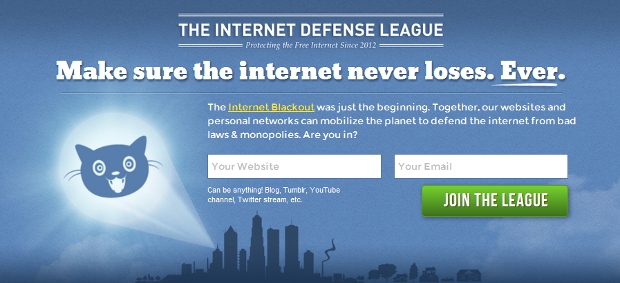Mozilla, WordPress, Reddit and a number of other sites have joined forces to combat copyright crackdown legislation, through a distributed lobby group called the Internet Defense League.
Launching on Thursday, the League offers code that webmasters can embed in their sites, so opposition to legislation such as ACTA or SOPA can be swiftly organised. “When the internet’s in danger and we need millions of people to act, the League will ask its members to broadcast an action,” the League’s website explains.
Fittingly, given the membership of the Cheezburger Network, the League’s equivalent to the bat signal is the ‘cat signal’, a sign representing what is the near-official mascot of the web. Expect to see it shining into the sky on Thursday night in London, San Francisco, New York, Washington DC and, weirdly, Ulaanbaatar in Mongolia — the League’s launch parties are designed to coincide with the release of the new Batman film, The Dark Knight Rises.

Although the tone is light-hearted, the League’s membership shows a serious side. Digital rights groups such as the Electronic Frontier Foundation (EFF) and Public Knowledge are in there, as are content platforms such as Grooveshark, WordPress and, yes, Cheezburger — all of whom have much to fear from the more overreaching side of the war on copyright infringement.
The point of this self-described “loose coalition” is to build on the success of previous pushbacks against the copyright lobby, notably the mass action that saw SOPA and PIPA defeated in the US. In Europe, the defeat of ACTA could be added to that list.
“Together, our websites and personal networks can mobilise the planet to defend the internet from bad laws and monopolies,” the League’s site reads.
Grey areas
There have long been calls for the copyright debate to move beyond where it is now. Apologies for quoting myself, but here’s what I said half a year ago: “Now is the time to build an international forum for reform, to solidify a coherent approach to copyright infringement and enforcement, and to make that argument heard.”
To sum up the reason for this call, the internet is (to put it mildly) very important, and copyright enforcement legislation does frequently include measures that would unreasonably limit online freedoms. While the US protects fair use, for example, many other countries do not: if it had not been defeated, ACTA may have outlawed the parodies we know as memes for those living in Europe.

At the same time, copyright infringement is a real problem for many artists — it neuters the business model that they could in recent decades take for granted as their means of support, and unfortunately there is not yet a clear replacement for that business model.
It’s a really complex debate, and complex debates cannot be had while one side is massively more powerful than the other.
Right now, when it comes to co-ordination and influence, there is no denying that the copyright lobby is on the winning side. The evidence can be found in the identikit language in myriad trade agreements (ACTA, CETA, the EU-Korea agreement and so on), all calling for copyright infringement and DRM circumvention to be made a criminal offence, and sometimes urging legislators to cut repeat offenders off the internet.
That doesn’t happen by accident. It’s an organised, multi-pronged attack that is designed to make sure the copyright lobby’s aims are achieved, even if some attempts get shot down. Which, if you look at it from a certain angle, is fair enough — that’s what lobbies do. However, if there is no co-ordinated effort to push back from the other side, then everybody who uses the internet becomes beholden to that one lobby. That’s neither healthy nor right.
Fighting back
The Internet Defense League intends to organise flash campaigns against what it sees as odious legislative attempts, as soon as possible after they are identified as threats. Its members will then encourage their own millions of users to lobby the legislators. It’s a different approach to that taken by the other lobby, but as SOPA and ACTA have shown, it is very effective.
It will be very interesting to see how the Internet Defense League works in practise. As it points out, “members choose on a case-by-case basis to participate in alerts [and] the views in alerts aren’t always endorsed by all members”. It’s an open and non-pressuring approach, and it will in time give a good indication of how commonly the views of the League’s members are held.
Then again, the ‘copyright lobby’ is not always itself a monolithic being. This is a debate that is full of grey areas, and one where all participants will have to show flexibility if a resolution is to be reached.
But that resolution is some way away. For now, the most we can hope for is a balanced debate, and the assembly of the Internet Defense League is a step in that direction.
